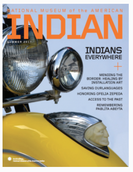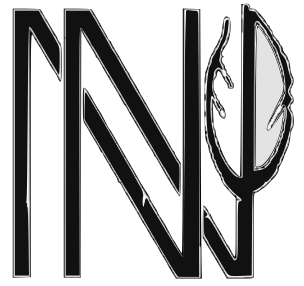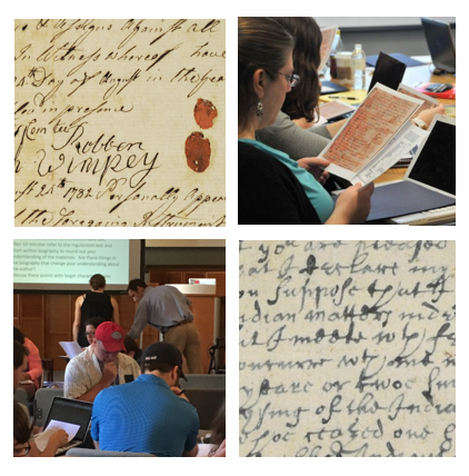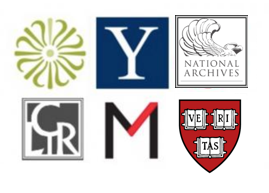Who We AreThe Native Northeast Research Collaborative (formerly The Yale Indian Papers Project) is an inclusive digital humanities endeavor that engages tribes, scholars, educators, students, and the general public in the study of the Native presence in the Atlantic Northeast.
The Collaborative accomplishes its mission through a number of "common ground" programs and initiatives that seek to bring together voices of many stakeholder communities with those in academia. With tribal partnerships extending throughout New England, New York, and the Mid-West, the Collaborative represents an innovate model of intercultural cooperation that brings research on Northeastern Indians into the 21st Century. |
|
Our Mission
|
To recover and provide greater access to the history of the Indigenous people(s) of the Atlantic Northeast for the purposes of research, teaching, scholarly analysis, museum exhibits, storytelling, and community-based projects
|
Our Methods |
The Collaborative recovers and publishes a historical documentary record of Indigenous peoples in the Native Northeast while bringing scholars and Native communities together in professional and ethical ways. It works especially with and through tribal communities connected to the greater Southern New England region on several programs and initiatives that de-colonize the archives and scholarly method.
The Native Northeast Portal Primary source materials by, on, or about Northeast Indians from repositories around the world are digitized, transcribed, annotated, reviewed by the appropriate contemporary descendant community representatives, and brought together with scholarly annotations and tribal commentary into one edited digital collection. The freely-available Portal currently contains thousands of primary resource records associated with scores of Native communities. Educational Outreach Initiatives The Collaborative promotes its educational mission through research consultations, classroom presentations, and teacher workshops, providing information to inspire a new generation of scholars to pursue careers in the Humanities or be enlightened by the Native world around them. Tribal Engagement Initiatives Historical documents and the stories they tell can be repurposed for tribal community needs. The Portal's resources have been applied to several reservation archaeological investigations, cultural programs, repatriation efforts, and museum exhibits. Native American Internship Program Designed to engage individuals in the processes of a digital humanities project, the Internship Program offers community scholars the opportunity to recover the Indigenous historical record in various ways: transcribing, annotating, managing databases, and creating community-based stories. Mukurtu Northeast Hub Initiative The initiative is part of a national outreach designed to provide training and support for users of the Mukurtu content management system in this region. The effort focuses on engaging with and fostering collaborations between Native communities and the cultural heritage institutions that hold materials relevant to those communities. |
|
Our Impact
|
New England Indigenous Community: Inclusion & Network Building
Academic Community: Pedagogical Outreach
Global Academic Community:Tribally-Mediated Scholarly Resources
|
Our Story |
The Yale Indian Papers Project began more than 20 years ago as a response to pressing needs of the New England tribes, academics, and scholarly researchers, who were working on various efforts -- academic scholarship, cultural revitalization, archaeological investigations, museum development, federal recognition research, or land management.
With advice from these stakeholder communities, Project organizers committed to deliver reliable access to primary sources of American Indians in the Northeast with the prospect of providing new Atlantic World perspectives on the Native presence in the region. In building its intellectual infrastructure, Project editors sought out interested Native historians and tribal representatives as well as scholars in the field from the U.S. and the U.K. as advisors, consultants, and potential editorial collaborators. The Project came to Yale University in 2003, where it established itself as one of the country's leading Native American collaborative scholarly editing endeavors. In 2008, staff offices moved to Yale's Lewis Walpole in Farmington, CT. In 2016, the Project transferred to Yale's Divinity School. A number of grants (see below) allowed for the publication of three centuries of political, religious, economic, and military materials regarding Native communities in Connecticut and Massachusetts, including tribal petitions about land loss, slavery, missionary efforts, African American presence, colonial, imperial, and state intervention, westward migration, and Indigenous leaders' efforts to express their sovereignty to an increasingly indifferent world. These themes have proved to be particularly useful for scholarly publications, student research, and tribal investment in Native American and Indigenous Studies. By 2017, the Project began a series of transitions -- adopting the cultural protocol-based Mukurtu CMS as its publishing platform and developing pathways for more meaningful collaboration with the appropriate contemporary descendant communities. More recently, to emphasize the nature of its work, the Project updated its name to the Native Northeast Research Collaborative. With outreach efforts to foster communication between the academy and Native people, the Collaborative is recognized by scholars, tribal communities, and grant funders as an effective example of Native collaborative digital humanities. During its residency at Yale University, the Collaborative (as the Yale Indian Papers Project) has been generously supported by the Lewis Walpole Library, the Yale Divinity School, and the following grant funding:
|
Recent Publications

Paul Grant-Costa and Tobias Glaza, "Access to the Past: A New Tribal-Friendly Approach Explains Old Archives," American Indian, Summer 2017, Volume 18, No. 2



